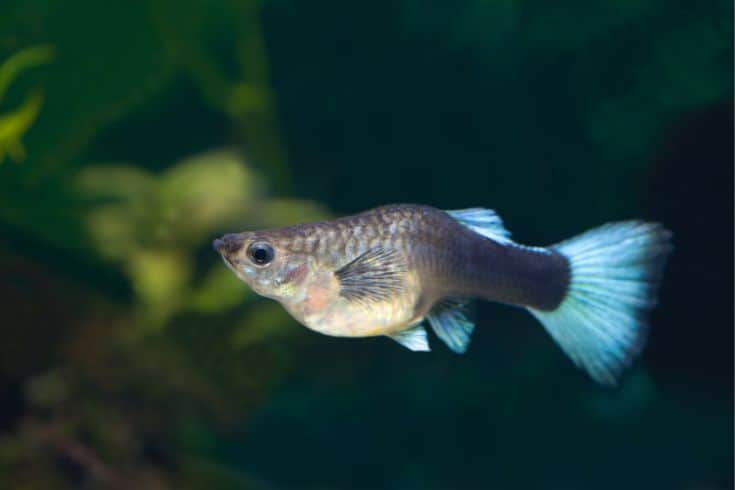Guppies are a popular freshwater fish species that many aquarium enthusiasts enjoy keeping. If you’re thinking of adding guppies to your aquarium, you might ask yourself one question, do guppies need a heater?
The answer is yes, guppies do need a heater to maintain a stable and healthy environment in their tank. Tropical fish require warm water and a heater to avoid temperature fluctuations that can cause stress and illness.
In this article, we’ll discuss heaters for guppy tanks, covering tips for choosing the right one and maintaining a stable water temperature for pet guppies.
Do Guppies Need A Heater?
In short, yes – guppies need aquarium heaters to replicate the water conditions of the tropical climate they come from. Guppies are tropical species, so they need warm water to thrive. The ideal temperature range for guppies is somewhere between 72-82°F. Without a heater, your tank’s temperature may dip to dangerous levels, leading to a decline in your guppies’ body temperature.
Under some circumstances, you may not need a heater. For instance, if you live in a warm climate, you may be able to keep your guppies without one. Even so, you’ll want to make sure that temperatures do not fluctuate between day and night, or between seasons. Rapid fluctuations like these, even if the temperatures stay within the guppies’ optimal range, can still be hazardous to their health.
Why Do Guppies Need A Heater?
Just in case you’re still on the fence about whether or not to purchase a heater for your guppies, here are a few good reasons why you should. Trust us – your guppies will thank you!
To Keep Illnesses At Bay

Guppies are some of the hardiest freshwater fish around. But even these resilient fish need to have the right water temperature in order to stay healthy. Without a heater, your tank’s temperature can dip too far below the optimal level, causing your guppies to become susceptible to all types of diseases. The last thing you want is for your fish to get ill, when it could have been easily prevented.
Heaters also prevent illnesses by ensuring that the water temperature stays relatively constant. If you’ve ever caught a cold from cycling rapidly between temperature extremes, it’s easy to imagine your fish being vulnerable in a similar position. A good heater – used with a reliable thermometer- helps keep things stable.
To Facilitate Reproduction
Yes – although guppies are known for being prolific breeders, a heater is still necessary for successful reproduction. Like many fish, guppies are more inclined to mate and reproduce when the water temperature is on the higher end of their preferred range (78-82°F). At these temperatures, they will be more active and have a greater urge to reproduce.
On the other hand, lower temperatures can cause your guppies to behave in sluggish, lethargic ways. This won’t just make it harder for them to reproduce – it can also lead to apathy and a decline in overall health. Over time, this can create a vicious cycle in which your fish become less healthy, and produce fewer offspring, many of which will likely be just as weak and unhealthy.
Though it may sound a little pessimistic to assume that a few degrees can make a big difference in the health of your guppy fry, the truth is that water temperature is one of the most important factors in fish health and reproduction. There’s simply no point in risking your guppies’ well-being by keeping the water temperature at anything less than optimal – particularly if you intend to breed them.
To Maintain Overall Health
Last but not least, guppies need a heater to stay healthy. As already mentioned, they prefer water temperatures between 78-82°F, and anything outside of this range can cause them stress and discomfort. This ultimately leads to a weakened immune system and a greater susceptibility to disease, both of which can easily be avoided by simply investing in a good heater.

A heater also ensures that your guppies don’t experience drastic fluctuations in temperature. While some fish can tolerate sudden changes in temperature, guppies come from tropical areas and are accustomed to fairly consistent temperatures year-round. Sudden changes can cause them stress and make them more susceptible to disease and other health problems.
Choosing the Right Aquarium Heater
Now that we’ve established that guppy fish do, indeed, need a heater, let’s delve into how you ought to go about choosing the right heater for your tank. These are a few things you’ll want to consider, whether you’re purchasing a primary or spare heater.
Heater Size
The first and most important factor is the heater’s size. You may be trying to create the optimal temperature for baby guppies. Or protect your adult guppy against the many nightmarish diseases they are susceptible to when things fall outside their ideal water temperature range. Either way, you’ll want to make sure that you get an appropriately-sized heater.
To do so, it’s vital to understand the relationship between heater wattages and tank size. Generally speaking, you’ll want to opt for approximately 5 watts per gallon. This assumes that you have a typical indoor aquarium set up – one in which the ideal temperature of your tank is about 10 degrees higher than the room or air temperature. Your tank should also have a lid to prevent heat loss.
Naturally, colder temperatures will require larger heaters, as will tanks that require warmer water temperatures. For instance, you may need to go up to 10 watts per gallon if you are trying to keep your guppy fry healthy, as they are in a more fragile state than adult guppies. We recommend adjustable heaters for this purpose, as they allow you to keep your fish tank at the desired temperature.
Here’s a handy chart to help you determine the appropriate heater size for your tank:
Tank Size
5 gallons
Minimum Heater Size
25 watts
Maximum Heater Size
50 watts
Tank Size
10 gallons
Minimum Heater Size
50 watts
Maximum Heater Size
100 watts
Tank Size
15 gallons
Minimum Heater Size
75 watts
Maximum Heater Size
150 watts
Tank Size
20 gallons
Minimum Heater Size
100 watts
Maximum Heater Size
200 watts
Tank Size
25 gallons
Minimum Heater Size
125 watts
Maximum Heater Size
250 watts
Tank Size
30 gallons
Minimum Heater Size
150 watts
Maximum Heater Size
300 watts
Tank Size
50 gallons
Minimum Heater Size
250 watts
Maximum Heater Size
500 watts
Tank Size
70 gallons
Minimum Heater Size
350 watts
Maximum Heater Size
700 watts
Safety Features
Choosing the right size heater is only part of the equation. You’ll also want to make sure that your water heater maintains the exact water temperature without any sudden spikes or drops. To this end, an internal thermostat is a must. This will automatically shut down the heater before the water gets too hot, and turn it back on before your tank experiences a drop in temperature.
In addition, you’ll also want to make sure that your heating element is adequately shielded. For instance, some heaters encase metal heating elements within glass tubes. This ensures that your guppy aquarium inhabitants don’t come into direct contact with any potentially hazardous components. Ideally, there should also be a suction cup and a shield made of durable plastic material for added safety.
Remember – no matter what type of heater you choose, safety should always come first. Resist the urge to cut corners when it comes to heating your tank and keeping your fish healthy. You don’t want to injure your fish in the process of maintaining the ideal water temperature. There shouldn’t be any kind of trade-off involved in giving your guppies a healthy life – even if it costs a bit more upfront.
Heater Type
Did you know that there are different types of heaters, each designed for a specific purpose? While all heaters can maintain a constant water temperature, submersible heaters tend to be the most popular option. Being submerged in water allows these heaters to work more efficiently compared to a heater that’s placed outside the tank.
On the other hand, hang-on heaters can be a good option if you want to create a more seamless, discreet heating setup. These heaters are typically less visible than submersible heaters. However, they will cost more to run, as they heat your water from outside the tank. This means that some heat generated will be lost to the environment. For this reason, a good tank thermometer is also essential.
Ultimately, the type of heater you choose boils down to personal preference. Is it essential that your heater remains out of sight? Opt for a hang-on-back filter if that’s the case. Is energy efficiency the be-all and end-all for you? A submersible heater will likely be the best option.
The Takeaway
So there you have it! We hope our guide has given you a better idea of why guppies need heaters, as well as how to choose the right heater for your tank. While there are some specific circumstances under which guppies may not need heaters, the vast majority of setups benefit from having one. If you’re in doubt, we recommend using a heater just to be safe.
Thanks for reading our article! If you found it helpful, please share it with a friend or a fellow fish enthusiast who might enjoy it just as much. Nothing matters more to us than the welfare of your fish, so please leave us a comment below if you have any lingering questions. Take care, and happy fishkeeping!
